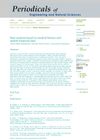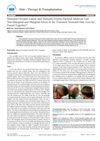 May 2021 in “Dermatopathology”
May 2021 in “Dermatopathology” The review emphasizes the need to recognize skin conditions that affect hair follicles and sweat glands to avoid misdiagnosis.
 June 2003 in “Obstetrical & Gynecological Survey”
June 2003 in “Obstetrical & Gynecological Survey” After chemotherapy for a gestational trophoblastic tumor, normal pregnancy rates are possible, but there's a slightly higher risk of the tumor reoccurring in future pregnancies.
 September 2015 in “Actas Dermo-Sifiliográficas”
September 2015 in “Actas Dermo-Sifiliográficas” People with advanced chronic kidney disease often have skin problems, which can be treated with various medications and procedures to improve their quality of life.
 28 citations,
August 2003 in “Steroids”
28 citations,
August 2003 in “Steroids” Hirsute women have lower type 2 17β-HSD enzyme levels, which improve with treatment.
 January 2024 in “The Indian Veterinary Journal”
January 2024 in “The Indian Veterinary Journal” A young goat with skin issues improved with medication and supplements.
18 citations,
January 2009 in “Acta neurologica Scandinavica” Long-term sodium valproate treatment for epilepsy generally caused mild and temporary side effects.
 2 citations,
February 2023 in “Transgenic Research”
2 citations,
February 2023 in “Transgenic Research” The E2 protein affects gene activity in hair follicles of mice.
 June 2003 in “Obstetrical & Gynecological Survey”
June 2003 in “Obstetrical & Gynecological Survey” Postmenopausal ovary stromal cells have a unique makeup and limited steroid production, suggesting androgens come from the adrenal gland.
 9 citations,
November 2020 in “Medical Hypotheses”
9 citations,
November 2020 in “Medical Hypotheses” Hair loss may link to weaker COVID-19 immunity, suggesting possible need for extra vaccine boost.
 8 citations,
March 2002 in “Archiv Der Pharmazie”
8 citations,
March 2002 in “Archiv Der Pharmazie” The compound 4c effectively inhibits the enzyme linked to hair loss.
 December 2019 in “Periodicals of Engineering and Natural Sciences (PEN)”
December 2019 in “Periodicals of Engineering and Natural Sciences (PEN)” Hair analysis can provide insights into a person's medical history and location over time.
 6 citations,
July 2015 in “Journal of Investigative Dermatology”
6 citations,
July 2015 in “Journal of Investigative Dermatology” Chicken feather gene mutation helps understand human hair disorders.
 19 citations,
June 2015 in “Actas Dermo-Sifiliográficas”
19 citations,
June 2015 in “Actas Dermo-Sifiliográficas” Chronic kidney disease can cause skin problems that affect patient quality of life, and treating these conditions can improve outcomes.
 4 citations,
April 2018 in “Biotechnology Letters”
4 citations,
April 2018 in “Biotechnology Letters” Human growth factor 20 can boost mouse whisker growth.
 2 citations,
November 2020 in “Der Hautarzt”
2 citations,
November 2020 in “Der Hautarzt” A patient's hair loss may be linked to their diabetes medication, Sitagliptin.
 1 citations,
February 2014 in “Hair therapy & transplantation”
1 citations,
February 2014 in “Hair therapy & transplantation” A baby boy had two types of temporary hair loss at birth, which might be two forms of newborn hair loss combined.
 2 citations,
May 2012 in “Indian drugs”
2 citations,
May 2012 in “Indian drugs” Finasteride, a hair loss treatment, works better and is more stable when delivered through specially prepared gels, leading to increased hair growth.
 13 citations,
April 2017 in “Journal of Alternative and Complementary Medicine”
13 citations,
April 2017 in “Journal of Alternative and Complementary Medicine” Traditional and complementary medicine may help with skin conditions, but more high-quality research is needed.
 January 2004 in “Springer eBooks”
January 2004 in “Springer eBooks” Telogen effluvium is a condition that causes temporary hair loss.
 32 citations,
October 2003
32 citations,
October 2003 Spironolactone is better than placebo for reducing excessive hair growth in women, but its effectiveness for acne is unclear due to small study sizes.

Green tea extract helped heal rabbit skin burns better than antibiotic ointment.
 August 2018 in “Journal of the American Academy of Dermatology”
August 2018 in “Journal of the American Academy of Dermatology” Tofacitinib is a potential alternative treatment for alopecia totalis, especially in patients with a shorter duration of the condition and more preserved hair follicles, but the overall response rate is low.
 January 2020 in “International journal of current research and review”
January 2020 in “International journal of current research and review” Exposure to plastics may increase the risk of irregular menstrual cycles and symptoms of hormone imbalance in teenage girls.
 24 citations,
November 2017 in “Aesthetic Plastic Surgery”
24 citations,
November 2017 in “Aesthetic Plastic Surgery” All types of Platelet-Rich Plasma (PRP) can treat hair loss, but homologous PRP works best due to its higher platelet count and growth factors from multiple donors.
 December 2017 in “Actas Dermo-Sifiliográficas”
December 2017 in “Actas Dermo-Sifiliográficas” Scalp cooling reduces chemotherapy-induced hair loss without increasing risk of skin metastases.
 16 citations,
July 2012 in “The New England Journal of Medicine”
16 citations,
July 2012 in “The New England Journal of Medicine” The patient was diagnosed with anorexia nervosa and severe malnutrition, requiring urgent refeeding and monitoring.
 October 2010 in “Journal of Men's Health”
October 2010 in “Journal of Men's Health” The conclusion is that doctors should be careful when prescribing 5α-reductase inhibitors due to possible serious side effects, and they should discuss these risks with patients.
1 citations,
March 1995 in “Pharmacoepidemiology and drug safety” Taking oral contraceptives while on isotretinoin may increase the risk of high triglyceride and cholesterol levels.
 November 2009 in “Eclética Química”
November 2009 in “Eclética Química” The conclusion cannot be provided as the document content is not available.
 2 citations,
August 1994 in “Archives of dermatology”
2 citations,
August 1994 in “Archives of dermatology” A 19-month-old boy with a rare hair disorder showed mild improvement with treatment, but his family chose gentle hair care due to limited success.




























